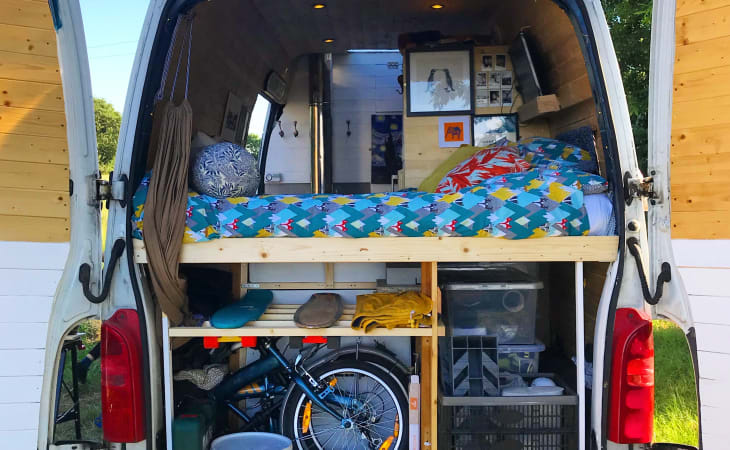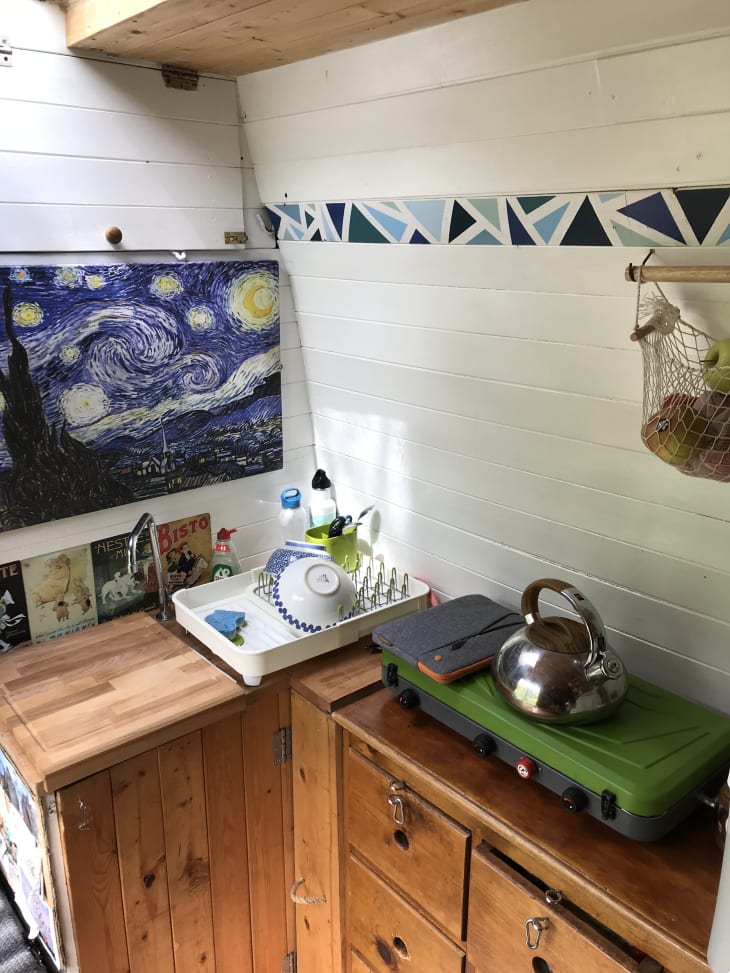Expert Tips for Cleaning a Campervan
February 5, 2024

Photo credit @sebsantabarbara
1. Monitor Mould & Mildew
One of the things that people never talk about when the top of vanlife comes up is Mould and Mildew. People always see it as having failed or something terrible that you shouldn’t talk about.
The thing is that it happens way more than you might think; it’s incredibly common, especially if you’re spending a lot of time in cold temperatures and have your heating on inside your van a lot.
The main reason for mould and mildew is down to poor airflow, and you’ll usually find that it occurs on the bottom half of the back doors of your camper, i.e. the garage area where you store your bikes, skateboards, and winter clothing, and underneath your mattress. I had airflow holes through to the back of my van and even I had some mildew in the winter months – it’s a fact of life, but if you keep on top of it, it won’t turn into a major problem.
The first line of defence is damp-proof paint on any wooden surfaces such as bed slats or on the cladding/boards on your back doors. Then consider adding some anti-mould sprays and a good cloth to your cleaning arsenal, taking care to give them a good wipe down on a regular basis and allowing to drop properly.
One bit of kit that I always recommend to people is the Dry Mat Anti Condensation webbing, a semi-rigid structure that allows air to flow underneath your mattress. It’s used on ships for exactly this reason, and ships come into contact with a heck of a lot more moisture than vans do!

Photo credit @sebsantabarbara
2. Regularly Empty Your Grey & Black Water Tanks
I remember when I was driving through Italy once and I could smell this very strange smell coming through into the cab. It turns out that the grey water had been in the tank for a little too long, and the bumpy road I was on was disrupting it sufficiently to make a bit of a pong.
The grey and black tanks (the black one is the one linked to your toilet) need to be emptied and cleaned regularly as smells build up in a small space. Granted, the toilets have a seal that locks the smell inside, but when you open them up to let your ‘business’ flow down into them, smells can still escape.
You need to spend time cleaning these tanks out when they are emptied – use some eco-friendly detergents when washing out your grey water tank and disinfect your black tank whenever you empty it.
Don’t be using the expensive and harmful chemicals in your toilet though; check out my next tip to help with that one!
And, if you need to change your water tank, check out out Lippert selection of water tanks.
3. Don’t Buy the Expensive, Branded Cleaning Products
The expensive products cost a lot for a reason, right? I suppose that must mean that they’re the best thing for your camper? When you’re starting out, it’s easy to get coaxed into buying all of the expensive products on the market, but they cost so much money and can seriously put a dent into your budget. Take the liquids for your toilet, for example. The products are super strong smelling, and goodness knows what is in them. The solution – use cheap, bog-standard (pun intended) washing powder in your toilet. The enzymes help to break down your waste and combat any smells, and you can keep putting in a spoonful as and when you need it. I used to buy a box for 80p from the supermarket every time I went! I used fairy liquid on most things in my van too, as well as products like Method and Ecover. That’s both in and outside of the van too! Anything that cuts through grease and grime on a plate can cut through mess on the outside of your van as well, twinned with some warm water and a bit of elbow grease!

Photo credit @sebsantabarbara
4. Combat Condensation
How is condensation caused?
Well, if I told you that it comes from your breath, when you cook, and when you have certain heating sources on (mainly gas) then you’ll realise that it’s pretty inescapable to avoid!

Photo credit @sebsantabarbara
Moisture in the air lands on a colder surface (which can be anything from your windows to the cold metal of your van, and if not sorted out properly can lead to rust and rot.
The first method to making sure that condensation isn’t a problem for you is to insulate everything thoroughly, stopping the transference of heat and keeping it in your van where it belongs.
Opening a window or door when cooking is also a great idea to make sure that steam leaves your living space. That will also help to combat odours in your van when cooking too (no-one wants bed sheets that smell like curry now, do they?).
Notice that I mentioned ‘gas’ up there too. Some heaters give off what they call ‘dry heat’ like a coal fire or a diesel heater. Gas tends to be referred to as a wet heat and can cause more condensation, so bear that in mind if you’re looking to install a gas night heater in your van.

Photo credit @sebsantabarbara
5. Wipe Down Your Solar Panels & Roof
So far, I’ve spoken only about cleaning the inside of your van, but from time to time you’re going to want to climb up onto the top of your roof and clean down your solar panels. Solar Panels are incredibly important for many vanlifers who go on off-grid adventures, and if your panels are dirty, then they’re not going to convert as much of that juicy sunlight into electricity for you to charge up all your gadgets and gear. Sticking with the ‘don’t buy expensive products’ theme, you can just clean down your panels with a car sponge and a bucket of water, then use a soft squeegee to dry off to keep a streak-free-shine. I have a foldable ladder that I use to get up onto the roof, but before I bought it, I just used to stand on a wall and tie a sponge to a stick. Lippert and I would like to advise you to not do that, however, so invest in a good foldable ladder or consider attaching one to your back door!
6. When You’re Washing Your Body, Wash Your Van Floor Too!
Waste not want not – water can be hard to come by when you’re off grid, so you need to be as savvy with it as possible. If you’re washing inside your van in your sink (or in a plastic crate filled with water from the kettle like I did through covid), then use the water that falls onto the floor to give your lino a good wash down too.
There’s not much more to say about this one – just make sure to not “splish-splash when you’re taking a bath” and get water all over the walls, otherwise you’re going to have more of those mould and mildew problems from the first point!

Photo credit @sebsantabarbara
7. Buy a Small Cordless Vacuum for All the Pesky Corners
Sweeping up doesn’t take long, but it’s hard to get your brush into all of the little nooks and crannies in your van. A brush is also pretty useless when it comes to cleaning carpeted surfaces such as up in your bulkhead or in your toilet cupboard if you’re wanting cosy warm toes when reading the paper in a morning.
Grab a small cordless vacuum that you can charge up on sunny days (or, if you’re sneaky, when you visit a café with your vacuum hidden in a backpack) and give your camper a weekly clean to keep on top of it.
Remember; a tidy tiny house equals a tidy mind!
8. Don’t Leave Washing up, Hanging Around
I’ve always been pretty diligent when it came to washing up pots and pans after cooking in a house, but even more so when living in a tiny home. The space is so small that you can’t really afford to leave them out, and I find it super hard to relax when looking at dirty chopping boards and used cups just sitting on the side.
Wash up and dry as you go; then, if you need to move parking spots quickly or want to get off first thing in a morning, you don’t have to worry about washing your forks up or trying to find a place for your dirty plates before you drive away.
9. Clean Out Drawers Periodically (No One Wants Ants!)
I’ve had to deal with ants and trust me; no one wants ants. I left my doors open for too long in France and the little critters decided that my mobile house was much nicer than the great outdoors, which I guess I should have taken as a compliment.
My van was always incredibly clean, but one contributing factor to getting ants can be dirty drawers. Sticky sauces and condiments like ketchup and honey or crumbs from crisps and bread can attract unwanted houseguests like ants and mice, so make sure you keep on top of your cleanliness and make sure you keep some elements of nature outside where they belong!
10. Spray Your Bin to Combat Odours
If you leave garlic pieces and peels in a bin, they start to smell very quickly if not double bagged. And if you’re not going to be somewhere near a bin for a while, then those smells can linger long after you’ve thrown the bag away.
I lined my homemade wooden bin drawer with an old vinyl tablecloth both in the bin itself and on the sealed lid so that I could wipe it down properly on a regular basis. This also meant that if the bin split or anything missed the bag, I could wipe it up easily and spray down with Method spray to keep it smelling fresh.
As I’ve said throughout this article, smells can take over small spaces incredibly quickly, so keep things fresh to make sure you stay relaxed, calm, and ready for adventure.
About the Author

Lippert guest blogger, Sebastian Antonio Santabarbara, is a thirty-two-year-old writer from Yorkshire, UK. His first breakthrough role came as the Head of Written Content for Van Clan, an online media brand documenting the van life movement with a weekly reach of over 5 million readers. This role has led to Sebastian being head-hunted to write several inspirational non-fiction books on alternative living (to be published by Frances Lincoln 2022/23) and Van Life for Dummies (published by John Wiley & Sons Sept 2022). He is also the Editor in Chief for Retro Dodo, a media/news company with a monthly reach of 1 million people. Follow his travels on Instagram!
Recent Posts
How to Save Space by Choosing the Right Campervan Bed Insights From Vanpuravida5 Easy Van Life Recipes
Is Vanlife Legal?
Expert Tips for Cleaning a Campervan
Things You Need to Know When Living in a Camper
10 Ideas for Making a Camper Feel More Like Home
A Beginners Guide to Stealth Camping
10 Top Tips on How to Insulate a Camper Van
10 Tips for Living in a Van
A Beginner’s Guide to Caravan Weights
View All ›
Never miss a blog post!
Subscribe to Lippert’s blog and receive an email when a new one is posted.